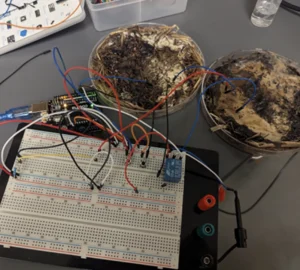A federal government watchdog agency says in a new report that the Drug Enforcement Administration should improve the process through which it considers granting religious exemptions for psilocybin and other controlled substances, asserting that the existing route lacks clarity on timing, evaluation, and other matters.
The 80-page report from the U.S. Government Accountability Office (GAO) notes that although psilocybin remains a Schedule I controlled substance under the Controlled Substances Act (CSA), people may petition the DEA for exemptions to use it—or other controlled substances—for religious purposes.
“DEA has established a process for these petitions, but its guidance doesn’t set clear timeframes for the decision-making,” it continues. “Exemption petitions have taken from 8 months to over 3 years to be resolved.”
GAO focused specifically on psilocybin use under the Religious Freedom Restoration Act (RFRA), which is meant to protect religious practices from undue government burdens. The agency found that the DEA exemption procedure itself was burdensome.
READ: DEA Schedules Hearing on Proposed Ban of Two Psychedelics
“Selected stakeholders reported several barriers to the legal access and use of psilocybin for religious practices under the Religious Freedom Restoration Act,” GAO says. “For example, DEA established a process for parties to petition for a religious exemption from the Controlled Substances Act to use controlled substances for religious purposes. However, DEA’s guidance does not inform petitioners on its timeframes to make determinations on completed petitions.”
In 2019, DEA began a rulemaking process around petitions for religious exemptions, the GAO report adds, “but there is no timeframe for issuance of the notice or final regulations.”
How to Grow Shrooms Bundle
Take Both of Our Courses and Save $90!
Learn More
While some who’ve petitioned DEA for special drug-related exemptions have accused the agency of dragging its heels, the new report is noteworthy in that the federal government itself is now criticizing drug enforcement officials.
“Over an 8-year period—from fiscal year 2016 through January 2024—DEA reported that 24 petitioners requested a religious exemption for various controlled substances,” GAO wrote. “As of January 2024, DEA reported that none of these petitions had been granted an exemption.”
Six of the 24 petitions were for psilocybin. Of those, three were withdrawn, and another three were still pending a DEA determination, the GAO report says.
“The three pending religious exemption petitions related to psilocybin ranged from about 8 months to over 3 years from the date of receipt,” it notes. “DEA’s information also showed instances where finalized actions regarding exemption petitions related to other controlled substances have been pending a determination for an extensive period—one almost 5 years and one almost 8 years.”
As for how to address the issues, GAO made four main recommendations.
First, it says DEA “should more clearly communicate the types of information that the Religious Freedom Restoration Act petitioners should provide to allow DEA to evaluate petitions for religious sincerity.”
It also says the agency should “more clearly communicate the standards and relevant factors” when making a determination as well as “establish timeframes for DEA to make determinations on completed religious exemption petitions.”
It further encourages DEA to provide “information for petitioners to be able to receive updates on the agency’s process related to exemption reviews.”
Each of the four recommendations is attached to a status tracker. “When we confirm what actions the agency has taken in response to this recommendation,” it says, “we will provide updated information.”
The review results from a request from Congress in 2022. In a report attached to spending legislation, lawmakers said GAO should look at the impact of CSA enforcement in jurisdictions allowing for psilocybin, barriers to accessing the psychedelic for medical use, recommendations on how to remove research blockades and more:
Psilocybin Report—The Committee directs GAO to report to Congress within one year of the date of enactment of this Act on the barriers to State, local, and Tribal programs that incorporate psilocybin products, including for therapeutic use and religious, Indigenous, or spiritual practices. The report shall: (1) review the impact of Controlled Substances Act enforcement on psilocybin use legally sanctioned by States, local governments, and Tribes; (2) identify barriers to accessing therapeutic use of psilocybin in States that have made such use legal under State law; (3) recommend ways to improve the processes used to obtain Federal authorization to conduct research with psilocybin-related substances; and (4) identify barriers to legal access to and use of psilocybin for religious, Indigenous, or spiritual practices under the Religious Freedom Restoration Act.
READ: Church of the Eagle and the Condor Can Now Drink Ayahuasca Legally in the US
While exemptions from the Controlled Substances Act for religious use are rare, they’re not entirely unheard of. A legal settlement in April between several government agencies and an Arizona-based nonprofit, for example, permits the group to import and use ayahuasca as a religious sacrament.
The organization, the Church of the Eagle and the Condor (CEC), said at the time that it was “the first non-Christian church to receive protection for its spiritual practices regarding Ayahusca,” adding that the development under RFRA marks “the first time in history a church’s right to import and share its sacrament has been secured without going to trial.”
CEC sued DEA, the Department of Justice (DOJ), the Department of Homeland Security (DHS) and Customs and Border Protection (CBP) in 2022 over DHS’s seizures of shipments of ayahuasca intended for ceremonial use. The government had also threatened that the group and its members could face federal prosecution.
Last month, however, the federal government said that settlement was irrelevant in the case of a separate psychedelic church in Iowa that wants to incorporate ayahuasca into its ceremonies.
The Iowaska Church of Healing first sent its petition to the Drug Enforcement Administration (DEA) asking for an exemption around ayahuasca use in 2019. A separate request for a tax exemption with the Internal Revenue Service (IRS) initially received no response from the agency, according to court filings.
The church found an unusual ally in anti-drug U.S. Sen. Chuck Grassley (R-IA), who court filings say was instrumental in expediting the regulatory appeals process back in 2021. A Grassley spokesperson told Marijuana Moment the following year that the senator’s help shouldn’t necessarily be viewed as an endorsement of the church’s point of view on psychedelics, however.
Some have also criticized DEA’s clarity on determinations and timelines for petitions unrelated to religious use.
A Washington State doctor seeking to legally use psilocybin to treat cancer patients in end-of-life care, for example, is currently suing DEA over delays and rejections related to a requested exemption under state and federal right to try (RTT) laws, which are intended to give patients with terminal conditions the opportunity to try investigational medications that have not been approved for general use.
“DEA has rejected each request,” lawyers for the doctor, Sunil Aggarwal, argued in an opening brief earlier this year, “but has never addressed the arguments that Dr. Aggarwal has raised in support of them.”
How to Grow Shrooms Bundle
Take Both of Our Courses and Save $90!
Learn More
“If DEA wants to disclaim authority to grant Dr. Aggarwal access to psilocybin under the CSA and RTT,” the brief says, “it must provide a reasoned explanation for how that decision comports with the CSA and the agency’s own precedent.”
*This story originally appeared on Marijuana Moment.
DoubleBlind is a trusted resource for news, evidence-based education, and reporting on psychedelics. We work with leading medical professionals, scientific researchers, journalists, mycologists, indigenous stewards, and cultural pioneers. Read about our editorial policy and fact-checking process here.
DoubleBlind Magazine does not encourage or condone any illegal activities, including but not limited to the use of illegal substances. We do not provide mental health, clinical, or medical services. We are not a substitute for medical, psychological, or psychiatric diagnosis, treatment, or advice. If you are in a crisis or if you or any other person may be in danger or experiencing a mental health emergency, immediately call 911 or your local emergency resources. If you are considering suicide, please call 988 to connect with the National Suicide Prevention Lifeline.
DoubleBlind Mag Read More




